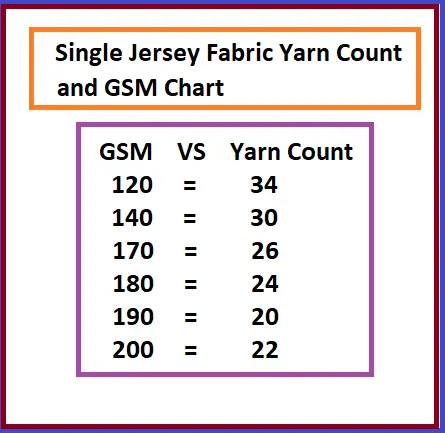Single jersey fabric is the most commonly used fabric all over the world. Single jersey fabric can be made from different fibers like 100%cotton, CVC, PC,100% polyester, viscose, rayon, linen, wool, or any other fiber. So that the yarn count and gsm will be different from each other. Single jersey fabric yarn count and gsm chart will also vary from each other.

Single jersey fabric yarn count and gsm chart:
I am sharing the actual using yarn count and gsm chart which is used in the present world practically. Let’s see the yarn count agonist the GSM 120,130,140,150,160,170,180,190,195,200,210,220 and 250. The chart given below is a 100% applied chart.
| Single jersey fiber type | Yarn count | Gsm |
| 100% cotton | 34/1 CB | 120 |
| Cotton 50% + 50% Modal | 40/1 50% CTN 50% MODAL | 130 |
| 100% Cotton | 30/1 C | 140 |
| PC 65%+35% | 34/1 PC 65/35 | 140 |
| 100% cotton | 30/1 CB | 150 |
| CVC 60%+40% | 30/1 CVC 60/40 VORTEX | 150 |
| PC 65%+35% | 30/1 PC 65/35 | 150 |
| PC 50%+50% | 30/1 SIRO 50/50 | 150 |
| Neps | 30/1 NCPS | 150 |
| 100% Cotton | 28/1 CB | 160 |
| 100% Cotton | 26/1 | 160 |
| 80% Cotton + 20% recycled cotton | 26/1 CB | 170 |
| 100% Cotton | 24/1 CB | 180 |
| PC 50%+50% | 24/1 PC 50/50V | 180 |
| 80% Combed+ 20% carded cotton | 20/1 CARD 80/20 | 180 |
| PC 50%+50% | 24/1 SIRO 50/50 | 180 |
| PC 65%+35% | 24/1 PC 65/35 VORTEX | 180 |
| 100% cotton | 20/1 | 190 |
| 90% Cotton+ 10% mell | 20/1 MEL 10% | 195 |
| 80% Polyester + 20% linen | 20/1 PL 80/20 | 200 |
| 100% Cotton | 22/1 CTN | 200 |
| 100% Cotton | 18/1 CB | 220 |
| 100% Cotton | 18/1 Compact | 210+00 |
| 100% Cotton Rotor | 30/2 PLY Rotor | 250+320 |
What does yarn count and GSM depends on?
The yarn count and GSM (grams per square meter) of single jersey fabric are determined by the thickness and weight/density of the yarn used. The thickness of the yarn determines the yarn count, whereas the weight of the fabric per square meter determines the GSM. Both factors influence the fabric’s overall appearance, comfort, and performance in many garment applications.
Expert Tips for Fashionable Apparel with Single Jersey Fabric
Choose the right yarn count: The yarn count refers to the thickness of the yarn used in the fabric. For single jersey fabric, a lower yarn count (such as the 20s or 24s) will result in a lighter and more breathable fabric, perfect for summer or casual wear.
Check the GSM chart: GSM (grams per square meter) is a measurement of the weight or density of the fabric. For single jersey fabric, a GSM range of 120-160 is ideal for light and comfortable clothing.
Consider the blend: Single jersey fabric can be made from various yarn blends, such as cotton, polyester, viscose, or a combination of these. Each blend has its properties and advantages.
Pay attention to finishing techniques: Finishing techniques can greatly affect the appearance and performance of single jersey fabric. Common finishing techniques for single jersey fabric include brushing, shearing, and mercerizing.
Experiment with patterns and prints: Single jersey fabric is versatile and can be easily printed or patterned to create unique and fashionable apparel. Consider using different printing techniques, such as screen printing, digital printing, or heat transfer printing, to add visual interest and personality to your apparel.
Quality test: Lastly, always test the quality of your single jersey fabric before using it in your apparel. Check for factors such as colorfastness, shrinkage, pilling, and durability to ensure that your fabric will withstand regular wear and washing. Investing in high-quality single jersey fabric will ensure that your apparel looks and feels fashionable for a long time.
Final word:
When working with single jersey fabric for fashionable apparel. It is crucial to consider the yarn count, GSM, yarn blend, finishing techniques, patterns and prints, and quality testing. The yarn count and GSM of the fabric are determined by the thickness and weight/density of the yarn used. As respectively, and can greatly impact the fabric’s overall characteristics. Choosing the right yarn count and GSM range is important for achieving the desired comfort and appearance of the apparel.
Additionally, considering the yarn blend, finishing techniques, and experimenting with patterns and prints can add uniqueness and style to the apparel. Finally, conducting quality tests to ensure the fabric’s durability and performance is essential for creating fashionable and long-lasting apparel with single jersey fabric.
By keeping these expert tips in mind, one can create fashionable apparel that is not only visually appealing but also comfortable and durable. So, when working with single jersey fabric, make sure to consider all these aspects to create fashionable apparel that meets the expectations of modern consumers. So that Single Jersey Fabric Yarn Count And Gsm Chart can be varied by changing the defined factor.
Research link:
You may read some other articles
- 100% cotton crepe single jersey fabric dyeing and finishing process with a complete practical experiment
- Cotton Linen Blend Fabric: The Ultimate Guide to Knitting, Dyeing, and Finishing Development
- Exclusive 75% Viscose Ponte Roma Fabric Collection
- How to Mercerize Fabric Dyeing Process For Knitted Fabric: A Step-by-Step Guide
[…] Single Jersey Fabric Yarn Count And Gsm Chart […]
[…] Single Jersey Fabric Yarn Count And Gsm Chart […]
[…] Single Jersey Fabric Yarn Count And Gsm Chart […]